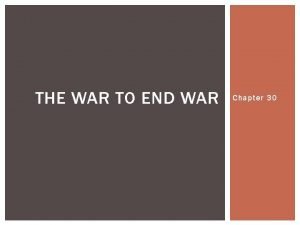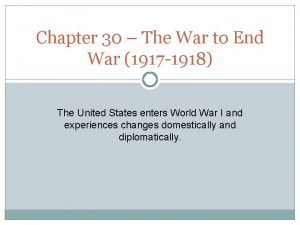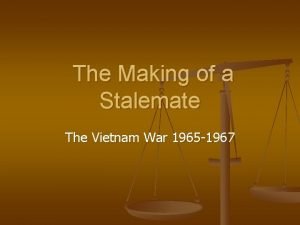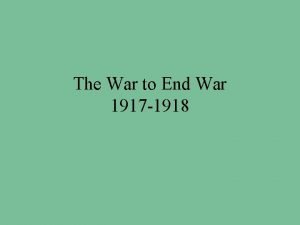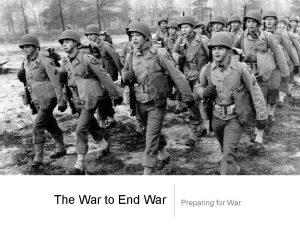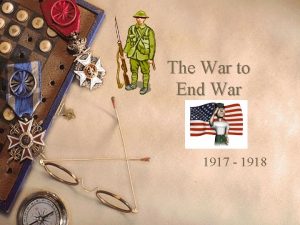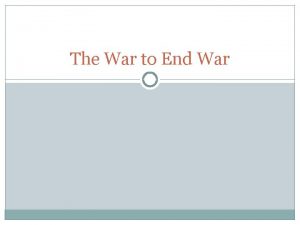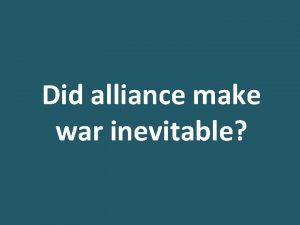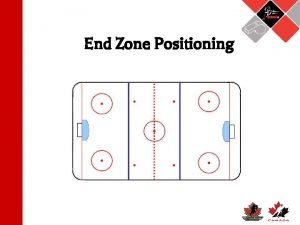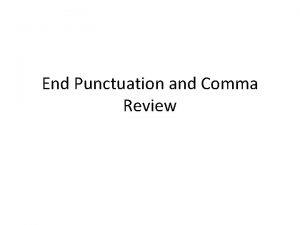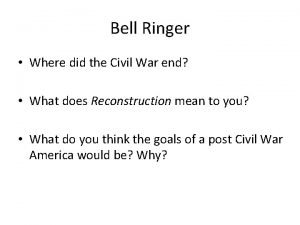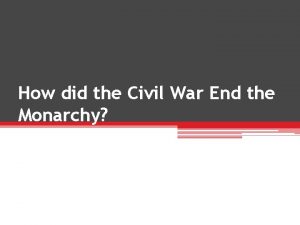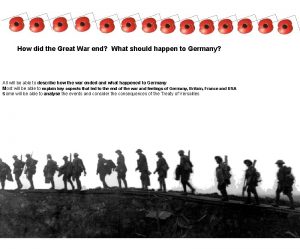End of War How did the war end
























- Slides: 24

End of War How did the war end? • Germany 1918 –sailors refused to sail out b/c felt no use fighting anymore – Rebellion in Germany led to new the imperial government being replaced by a republic! • No decisive battle to end war, but German war machine was exhausted – Allies had fresh troops from America • 11/11 at 11: 00 - The new Germany stopped the fighting


Versailles Today

Delegates at Versailles, 1919

Delegates at Versailles, 1919

The French wanted to crush Germany in the same place where Bismarck formed it in 1871.


David Lloyd George (Britain) Vittorio Orlando (Italy) Georges Clemenceau (France) Woodrow Wilson (US) Although there were delegates from 39 nations at the conference, the important decisions were made by the leaders of the three strongest Allied powers: the US, Britain, and France.





Germany’s punishment in the Treaty can be remembered as: BRAT 1. Germany had to accept the Blame for starting the war in the form of a “war guilt” clause. “The Allied and Associated Governments affirm, and Germany accepts, the responsibility of Germany and her allies for causing all the loss and damage to which the Allied and Associated Governments and their nationals have been subjected as a consequence of the war imposed on them by the aggression of Germany and her allies. ” Treaty of Versailles, Article 231

Germany’s punishment in the Treaty can be remembered as: BRAT 1. Germany had to accept the Blame for starting the war in the form of a “war guilt” clause. 2. Germany had to pay over $33 billion in Reparations, or fines. • The reparations covered the destruction caused by the war, pensions for millions of Allied soldiers, widows and families.

Germany’s punishment in the Treaty can be remembered as: BRAT 1. Germany had to accept the Blame for starting the war in the form of a “war guilt” clause. 2. Germany had to pay over $33 billion in Reparations, or fines. 3. Germany was forbidden to have an Army over 100, 000 men, no submarines, and no air force. 4. Germany lost Territory and colonies to Britain and France. • Alsace and Lorraine were returned to France, land was lost to Poland, and the Rhineland was to be occupied by Allied troops.



The industrial Rhineland would be occupied by Allied troops for 15 years.

Austria. Hungary The break-up of the Austro-Hungarian Empire led to the independence of four new nations: Poland, Czechoslovakia, Hungary, and Yugoslavia. Serbia, Bosnia, Herzegovina, and Montenegro made up Yugoslavia. Austria, deprived of its entire empire, became a small nation. Ally Romania gained land, while Central Power Bulgaria lost land.

Ottoman Empire The weak Ottoman Empire (Turkey) was also broken up. Some territories were given independence, while others such as Palestine, Iraq, and Syria were given to Britain and France.

Communist Since Russia’s new communist government left Russia the war early, they were not invited to Versailles. The Allies wanted to weaken Russia to keep communism from spreading westward. Four new nations gained independence from Russia: Finland, Estonia, Latvia, and Lithuania. Russia also lost land to Poland Romania.

Wilson’s Creation • President Wilson succeeded in forming the League of Nations. • The countries promised to take cooperative economic and military actions against any aggressive country. • Although Wilson’s idea, the U. S. Congress rejected the League because Americans feared it would pull them into future European wars. • The lack of the US severely weakened the League.

Many nations were upset with the Treaty of Versailles, and felt their goals had not been achieved. • Germany was horrified by their reparations, reduced military, and territorial losses. • Americans also felt the Treaty was too harsh on Germany, and the US Congress refused to approve it. • Italy wanted to gain more land from Austria than it received. • Japan was angry because the Allies did not recognize all of its claims in China.

• China was angry that Japan had been given Germany’s sphere of influence. • Russia was angry they were not invited to Versailles, and upset over losing Finland, Estonia, Latvia, and Lithuania. Unfortunately, the treaty that ended the “war to end all wars” merely provided the motivation for WWII, just twenty years later.
 Chapter 30 the war to end war
Chapter 30 the war to end war Chapter 30 the war to end war
Chapter 30 the war to end war Did the vietnam war end in a stalemate
Did the vietnam war end in a stalemate Which marked the end of the peloponnesian war
Which marked the end of the peloponnesian war Hình ảnh bộ gõ cơ thể búng tay
Hình ảnh bộ gõ cơ thể búng tay Ng-html
Ng-html Bổ thể
Bổ thể Tỉ lệ cơ thể trẻ em
Tỉ lệ cơ thể trẻ em Voi kéo gỗ như thế nào
Voi kéo gỗ như thế nào Chụp tư thế worms-breton
Chụp tư thế worms-breton Alleluia hat len nguoi oi
Alleluia hat len nguoi oi Môn thể thao bắt đầu bằng từ chạy
Môn thể thao bắt đầu bằng từ chạy Thế nào là hệ số cao nhất
Thế nào là hệ số cao nhất Các châu lục và đại dương trên thế giới
Các châu lục và đại dương trên thế giới Công thức tính thế năng
Công thức tính thế năng Trời xanh đây là của chúng ta thể thơ
Trời xanh đây là của chúng ta thể thơ Cách giải mật thư tọa độ
Cách giải mật thư tọa độ 101012 bằng
101012 bằng độ dài liên kết
độ dài liên kết Các châu lục và đại dương trên thế giới
Các châu lục và đại dương trên thế giới Thơ thất ngôn tứ tuyệt đường luật
Thơ thất ngôn tứ tuyệt đường luật Quá trình desamine hóa có thể tạo ra
Quá trình desamine hóa có thể tạo ra Một số thể thơ truyền thống
Một số thể thơ truyền thống Cái miệng bé xinh thế chỉ nói điều hay thôi
Cái miệng bé xinh thế chỉ nói điều hay thôi Vẽ hình chiếu vuông góc của vật thể sau
Vẽ hình chiếu vuông góc của vật thể sau
